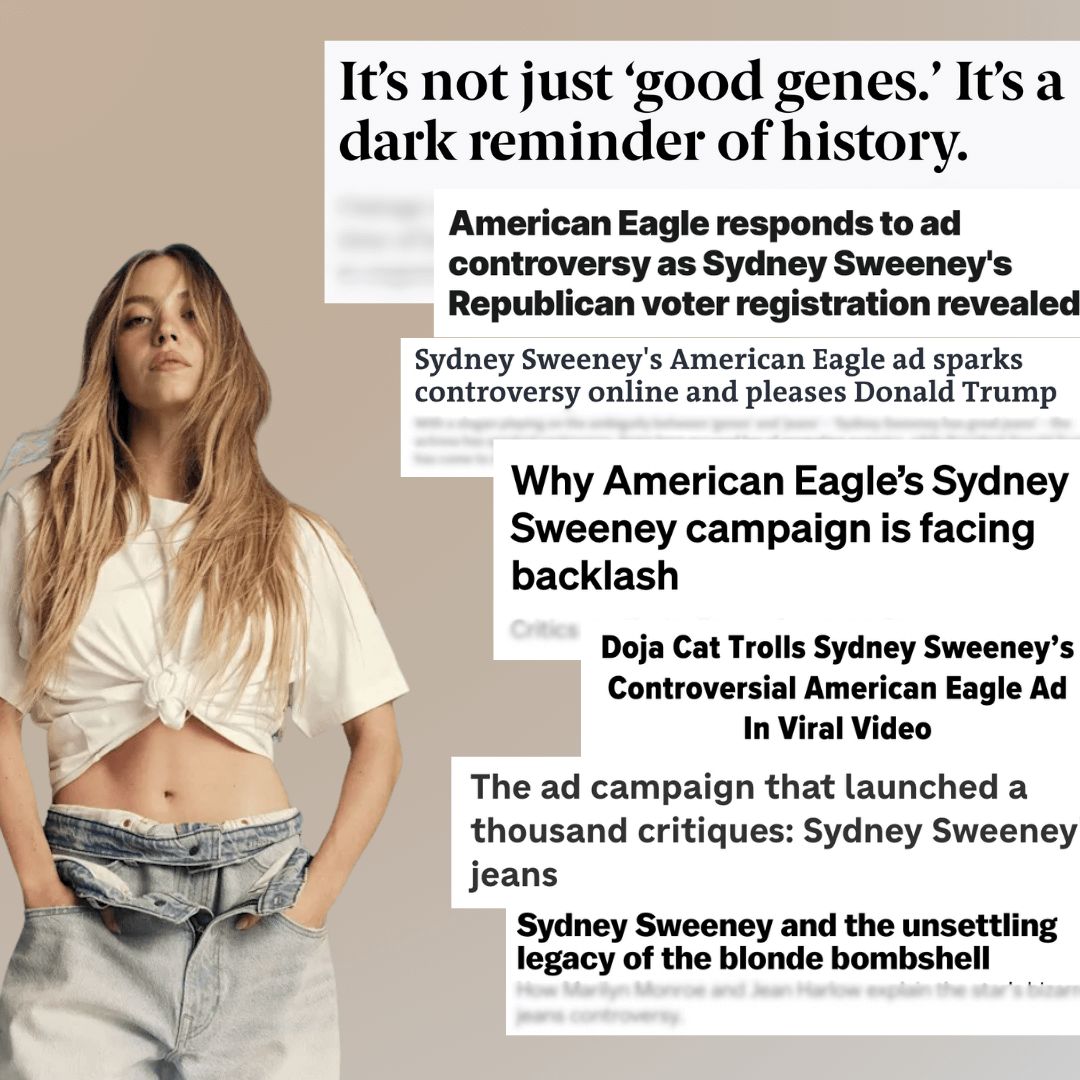We are excited to announce our $2M seed round led by Joa Capital.
Read Now

October 18, 2025
Fabiana Binte Mesbah
Few things ignite social media faster than a clever wordplay gone wrong. In early 2025, American Eagle (AE) found itself in the eye of a cultural storm after launching its Sydney Sweeney denim campaign — an edgy, nostalgic ode to “great jeans.” The campaign’s tagline, “Great Jeans. Great Genes.”, was meant to be a cheeky nod to fit and confidence. Instead, it detonated online.

Caption: American Eagle X Sydney Sweeney
Within hours, Twitter threads accused AE of promoting eugenics and white supremacy. Activists vandalized billboards. Liberal commentators called for boycotts. Then, former President Trump publicly endorsed the ad — instantly turning a pop-culture moment into a political firestorm.
The brand was facing a textbook brand crisis. And yet, American Eagle did what few brands dare to do in an outrage economy: it didn’t apologize.
While social media burned, AE’s internal response was remarkably restrained. According to insiders, CEO Jay Schottenstein told executives to “stay calm” and avoid reactive statements, and has continued to defend the campaign. There were no rushed apologies, no panicked retractions, no “we missed the mark” notes.

Caption: The campaign sparked massive online controversy
Behind the scenes, AE was quietly analyzing the data. Instead of assuming social outrage equaled public rejection, the company monitored sentiment analysis across multiple channels — tracking how different audiences actually felt.
And what the data showed was stunning:
This was the first clue that the viral backlash might not reflect the brand’s real customers.
The payoff was immediate. Within weeks, American Eagle added 1 million new customers, stock prices jumped 25%, and both The Sydney Jean and The Sydney Jacket sold out. The campaign generated a jaw-dropping 40 billion media impressions, outpacing nearly every denim campaign of the decade.
By holding its nerve, AE demonstrated that social noise doesn’t always equal business risk. Sometimes, controversy amplifies brand identity rather than eroding it — if you have the data to prove it.

Caption: AE’s response to the controversy
This campaign wasn’t just lucky. It was a masterclass in data-driven crisis management. Here’s what set AE apart from brands that crumble under pressure:
Social media backlash often amplifies fringe outrage, not mainstream opinion. AE understood that what trends on X (formerly Twitter) doesn’t necessarily reflect what resonates with customers. Marketers need to distinguish between noise and narrative. Instead of reacting to the loudest voices, analyze where the sentiment comes from — is it your core demographic or just online activists?
The instinct in a brand crisis is to panic. But AE’s calm response showed the power of letting data, not fear, guide decisions. Track engagement, sales, search intent, and community sentiment before responding. Often, the numbers tell a very different story than the trending hashtags.
Here’s a few more social media crisis examples you might find relevant.
Once a crisis breaks, consistency becomes your strongest defense. AE’s “stay calm” directive prevented conflicting statements that could’ve fueled the fire. The takeaway? Establish a single, authoritative voice — ideally through a core crisis team that coordinates messaging across PR, marketing, and leadership.
Handled strategically, controversy can sharpen brand positioning. AE’s refusal to apologize reinforced its confident, youth-driven identity — a move that made it more appealing to its audience. Sometimes, standing firm signals authenticity in a world where brands often bend to online pressure.
AE’s decision not to rush a response was a masterclass in restraint. In high-velocity news cycles, silence — even briefly — allows a brand to gather facts, monitor trends, and decide whether to engage or ride the wave. Quick apologies can look reactive; thoughtful timing can look strategic.
The most important metric wasn’t tweets or headlines — it was customer behavior. While social sentiment seemed negative, AE’s actual sales told a different story. Marketers should always pair sentiment data with performance metrics: traffic, conversions, and retention. That’s where the truth of a crisis lives.
1. How can brands detect the difference between real and performative outrage?
By using advanced sentiment analysis tools that classify emotions (anger, sarcasm, support) across languages and dialects.
2. What’s the best first step when a campaign goes viral for the wrong reason?
Don’t rush a public statement. Use real-time brand monitoring to assess sentiment trends — especially among core customers. The data might reveal that silence is the smartest response.
3. Can controversy ever be good for business?
Yes — if the controversy aligns with your brand’s values and your audience data supports your stance. AE’s case proves that conviction, backed by analytics, can outperform panic-driven PR.
The Sydney Sweeney denim campaign will go down as one of 2025’s defining moments in brand management. It flipped the script on crisis response, showing that the smartest move in a brand crisis isn’t always an apology — it’s understanding the sentiment behind the storm.
Discover How Audience Intelligence can help your brand grow